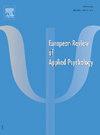Chinese elderly tourists’ perceptions regarding rural tourism destination revisit and recommend intentions: Merging the value-attitude-behaviour and theory of planned behaviour
IF 1.4
4区 心理学
Q3 PSYCHOLOGY, APPLIED
European Review of Applied Psychology-Revue Europeenne De Psychologie Appliquee
Pub Date : 2025-06-01
DOI:10.1016/j.erap.2023.100927
引用次数: 0
Abstract
Purpose
Attracting senior tourists to spend their holidays in rural destinations may be an effective strategy for rural economic development in many countries, including China. To date, few empirical studies have been conducted to create a coherent comprehension of the elements influencing elderly tourists’ perceptions and choices of rural tourism destinations. This research aims to investigate the relationship between functional value, social value, hedonic value, novelty, attitude, subjective norm (SN), perceived behavioural control (PBC), and revisit and recommend intentions based on the theory of planned behaviour (TPB) and value-attitude-behaviour model.
Methodology
A total of 413 older tourists participated in this study, and the data collected were analysed and tested, followed by testing the postulated hypotheses through SPSS and structural equation modelling.
Findings
The research findings demonstrated that functional value positively influenced hedonic value and novelty, while social value positively influenced hedonic value, novelty, and attitude. Furthermore, SN had a positive influence on attitude, PBC, and revisit and recommend intention, while attitude and PBC had a positive influence on revisit and recommend intention.
Originality/value
This research expands the existing knowledge on the impact of various value aspects and components of TPB on older tourists’ rural tourism destination choice in tourism literature and their contribution to the key stakeholders in the tourism industry. Finally, the theoretical contributions, practical implications, and limitations of this research are illustrated.
中国老年游客对乡村旅游目的地重访与推荐意向的感知:价值态度行为与计划行为理论的融合
在包括中国在内的许多国家,吸引老年游客到农村目的地度假可能是农村经济发展的有效策略。迄今为止,很少有实证研究对影响老年游客对乡村旅游目的地的感知和选择的因素进行了连贯的理解。本研究基于计划行为理论和价值-态度-行为模型,探讨功能价值、社会价值、享乐价值、新颖性、态度、主观规范、感知行为控制、重访意向和推荐意向之间的关系。方法共对413名老年游客进行研究,对收集到的数据进行分析和检验,然后通过SPSS和结构方程模型对假设进行检验。研究发现:功能价值正向影响享乐价值和新颖性,社会价值正向影响享乐价值、新颖性和态度。SN对态度、PBC、重访和推荐意愿有正向影响,态度和PBC对重访和推荐意愿有正向影响。原创性/价值本研究扩展了旅游文献中关于城市规划的各个价值方面和组成部分对老年游客乡村旅游目的地选择的影响及其对旅游业关键利益相关者的贡献的现有知识。最后,阐述了本研究的理论贡献、现实意义和局限性。
本文章由计算机程序翻译,如有差异,请以英文原文为准。
求助全文
约1分钟内获得全文
求助全文
来源期刊

European Review of Applied Psychology-Revue Europeenne De Psychologie Appliquee
PSYCHOLOGY, APPLIED-
CiteScore
2.20
自引率
20.00%
发文量
38
期刊介绍:
The aim of the Revue européenne de Psychologie appliquée / European Review of Applied Psychology is to promote high-quality applications of psychology to all areas of specialization, and to foster exchange among researchers and professionals. Its policy is to attract a wide range of contributions, including empirical research, overviews of target issues, case studies, descriptions of instruments for research and diagnosis, and theoretical work related to applied psychology. In all cases, authors will refer to published and verificable facts, whether established in the study being reported or in earlier publications.
 求助内容:
求助内容: 应助结果提醒方式:
应助结果提醒方式:


